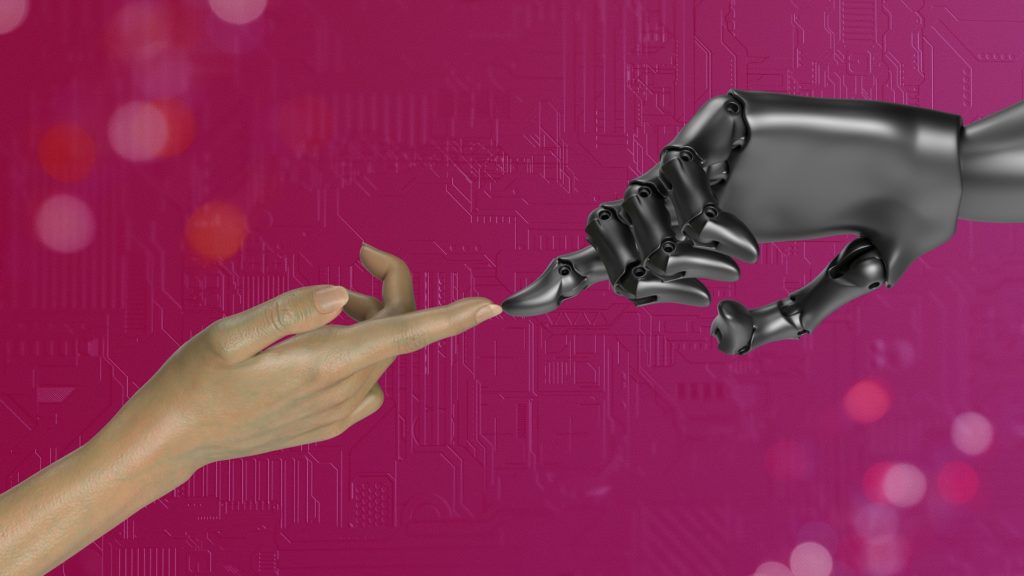Let’s talk about the time when the word IT didn’t yet exist, the time of the baby-boomers (for the record, we owe it to May 68 )!
Less than a generation later, everyone has had to adapt. Wasn’t it said at the time that the average worker changed profession twice in his or her lifetime?
Today, their grandchildren and great-grandchildren know that their original profession will have to change, or at least evolve regularly. This is to keep pace with the technological revolution, digitalisation and artificial intelligence (AI). AI is gradually unfolding its (sometimes devastating) effects on blue-collar and, above all, white-collar jobs.
Career guidance and reorientation.
Are our young people aware that the pace of change is set to accelerate to such an extent that the effects of the technological revolution of the last 20 years will be out of all proportion to the changes in jobs by 2030?
How will old jobs evolve into new ones? How can we help people to adapt in a world where they will have to do more and do it faster? Everyone agrees that many jobs will disappear. But how many new jobs will emerge thanks to the AI technological revolution? That’s the whole challenge of career guidance and the training that goes with it!
What jobs will there be by 2030-2040 ? What will the jobs of the future be ?
Specialists predict that the majority of jobs in 10 to 15 years’ time will not yet exist today! On the other hand, any current job that is easy to digitise will disappear in the very near future – we’re talking about 3 to 5 years. For the medium term, we can mention a few of the many possibilities:
Health and care-related professions
The pandemic has made us aware of the importance of the health sector in our daily concerns. On our B2B server dedicated to the assessment of soft skills and know-how, we find that the main users are in the health and care sectors (hospitals, pharma, insurance, coaching), followed by sectors linked to digitalisation and training.
The ageing of the population will automatically lead to a large number of new jobs in the world of healthcare and personal assistance. What’s more, all the traditional professions will undergo major changes, with the use of robotics to carry out a number of repetitive tasks. Or virtual reality to make up for the lack of medical specialists. Concrete examples of these developments in e-health are regularly reported in the television news, and as a sign of the times, insurance companies have begun to incorporate them into their own services.
Jobs linked to the ecological revolution and sustainable development
According to the ILO, tens of millions of new jobs directly linked to the green economy will be created over the next few years. Although ecological awareness was slow to develop, in recent years the movement has been growing exponentially.
Numerous professions linked to circular ecology are being developed to recover our waste as a raw material.
Jobs linked to digital technologies, communication and AI
They interact with all the other sectors of the working world. For example, there are all the new professions (influencers, community managers, SEOs, opinion leaders, bloggers, etc.) that have emerged in the world of communications over the last five years (to name but one). It’s easy to imagine the explosion of activities that are still unknown today, in the near future. Jobs in the digital field are obviously those that will require skills that are both specialised and diversified, as their field of application cuts across all sectors.
The importance of vocational guidance and training
Our authorities are aware of the importance of vocational guidance for young people. But the task is not an easy one: just imagine how difficult it is for teenagers to project themselves into a future that is so hard to pin down.
Getting to know yourself better is the key to better career guidance! The more motivated you are to do a job, the more effective you are at it. JobVision RIASEC provides a concrete response to this. It allows you to discover your own motivations and affinities with each of the 6 R.I.A.S.E.C typologies described by the American psychologist John Holland.
Each typology leads to its own type of profession or career orientation.
We are very fortunate in Switzerland to have a range of vocational training options, from the apprenticeship concept (so envied abroad) to the internationally renowned Grandes Ecoles.
How will Generation Y have to adapt?
Generation Y, i.e. today’s forty-somethings, have already started to become aware of the upheavals underway. Every day, they are feeling the effects, if not yet for themselves, then at least in their immediate environment.
The feedback from the coaching institutes that we count among our clients, in Switzerland and elsewhere in the world, is extremely clear: by analogy on the Beaufort scale, we would be at level 7 out of 12: Cool. Just before gale force winds!
Let’s remain confident…
We ran a campaign on the Swiss market, offering people the chance to get to know each other better and identify their own affinities in terms of professional orientation or career reorientation. This initiative confirmed a marked interest on the part of young people, as well as older sections of the population.
In conclusion, despite the uncertainties, we must remain confident in our strengths: a healthy economy, a solid education and an increasingly developed entrepreneurial spirit among young people. The working generations and those who will soon be working have all the weapons they need to face the many challenges that lie ahead.
#Babyboomers #GenerationY #CareerReorientation #ProfessionalOrientation #VersusTalentProfile #JobVision #PersProfile


